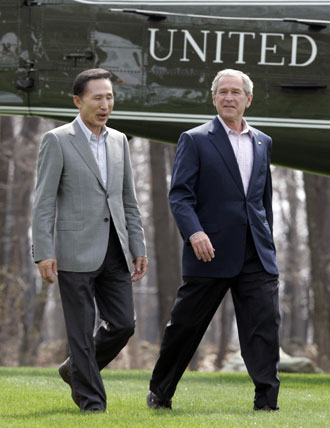New hopes and challenges for US-South Korea relations
(Xinhua)
Updated: 2008-04-20 14:39
Updated: 2008-04-20 14:39
One of the points that need to be addressed is the US' reportedly tentative deal with the DPRK, under which Pyongyang would merely acknowledge US proliferation concerns in a document that may not be made public.
 U.S. President George W. Bush (R) and South Korean President Lee Myung-bak walk towards a news conference at Camp David in Thurmont, Maryland, after private talks at the Presidential retreat, April 19, 2008. [Agencies] |
It is believed that bilateral talks between Pyongyang and Washington can facilitate diplomatic progress, but with the side-effect of drawing suspicion and criticism from other members of the six party talks, which also involve South Korea, China, Japan and Russia.
"Success in the talks requires coordinated diplomacy between the US and the North's (DPRK's) neighbors, especially with South Korea," said Michael Armacost, who served as the American undersecretary of state for political affairs in the 1980s and as ambassador to Japan and the Philippines.
"Today, there is a danger that South Korean conservatives may fear that Washington will ultimately acquiesce in North Korea's (DPRK's) nascent nuclear status. No attempt to contain, let alone eliminate, the North Korean (DPRK's) nuclear program can succeed unless the US and the Republic of Korea governments work closely together," he said.
TRADE BOOM ON THE CARDS
In a significant move, Seoul announced it was lifting its ban on US beef imports just hours before Bush welcomed Lee at Camp David. The friendly gesture is likely to remove a major impediment to action in the US Congress on a free-trade deal with South Korea.
South Korea, once the world's third-largest import market for American beef, had banned most American beef since 2003 after an outbreak of mad cow disease in the US Many US lawmakers had vowed not to take up the trade pact for discussion until the restrictions were lifted.
The lifting of the ban on US beef could thus pave the way for a bilateral trade boom.
Two-way trade between the US and South Korea in 2007 totaled more than 80 billion US dollars. The Wall Street Journal quoted analysts as saying that the proposed US-South Korea free trade deal could spur billions of dollars a year in added economic activity, boosting sales abroad of American goods and also creating new opportunities for US financial services companies.
|
||
|
||
|
|
|
|

